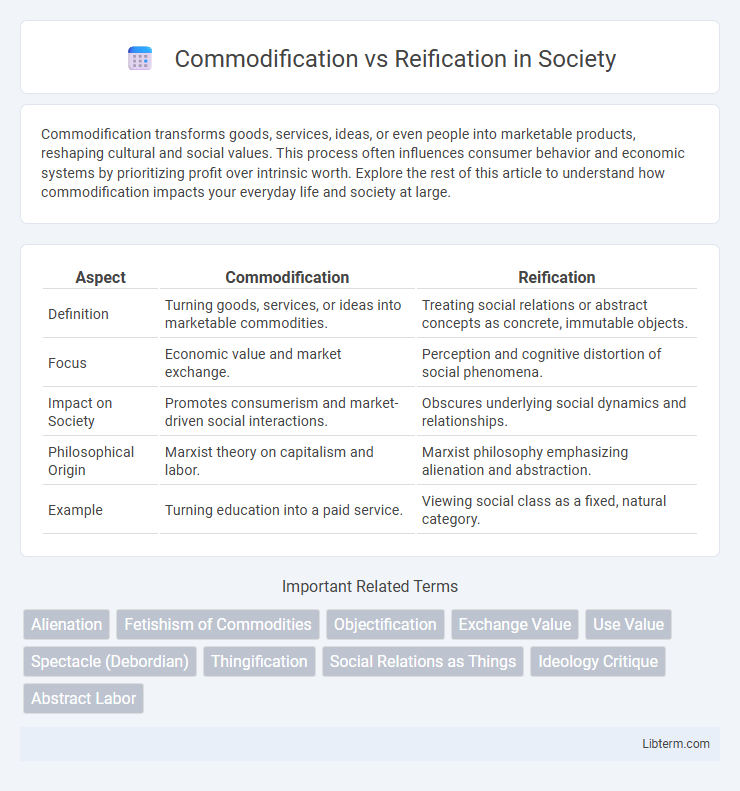Commodification transforms goods, services, ideas, or even people into marketable products, reshaping cultural and social values. This process often influences consumer behavior and economic systems by prioritizing profit over intrinsic worth. Explore the rest of this article to understand how commodification impacts your everyday life and society at large.
Table of Comparison
| Aspect | Commodification | Reification |
|---|---|---|
| Definition | Turning goods, services, or ideas into marketable commodities. | Treating social relations or abstract concepts as concrete, immutable objects. |
| Focus | Economic value and market exchange. | Perception and cognitive distortion of social phenomena. |
| Impact on Society | Promotes consumerism and market-driven social interactions. | Obscures underlying social dynamics and relationships. |
| Philosophical Origin | Marxist theory on capitalism and labor. | Marxist philosophy emphasizing alienation and abstraction. |
| Example | Turning education into a paid service. | Viewing social class as a fixed, natural category. |
Understanding Commodification: Definition and Context
Commodification refers to the process by which goods, services, ideas, or people are transformed into commodities that can be bought or sold in a market. This concept is critical in understanding capitalist economies where social relations are mediated by market exchanges. Commodification often influences cultural and social dynamics by assigning economic value to previously non-commercial aspects of life.
Reification Explained: Meaning and Historical Background
Reification refers to the process of treating abstract concepts, social relations, or human qualities as concrete, unchangeable objects, often leading to misunderstandings of their true nature. Rooted in Marxist theory, Georg Lukacs popularized the term in his 1923 work "History and Class Consciousness," emphasizing how capitalist societies transform human relations into things, obscuring the underlying social dynamics. This concept critically highlights how social phenomena are objectified, impacting consciousness and reinforcing systems of domination.
Key Differences: Commodification vs Reification
Commodification is the process of transforming goods, services, ideas, or people into commodities to be bought and sold in a market, emphasizing economic value and exchangeability. Reification, on the other hand, involves treating abstract concepts, social relations, or human qualities as concrete, tangible objects, leading to a distorted perception of reality. Key differences lie in commodification's focus on economic transactions and market dynamics, while reification centers on cognitive and social processes that objectify and simplify complex human interactions.
Origins in Marxist Theory
Commodification in Marxist theory originates from the concept of commodity fetishism, where social relationships are obscured by market exchanges, transforming goods and services into objects with independent value. Reification extends this idea by describing how human relations and social constructs become perceived as things, solidifying abstraction into concrete, seemingly immutable entities. Both concepts arise from Marx's critique of capitalism, emphasizing the alienation and objectification inherent in capitalist production and exchange processes.
Impacts on Society and Culture
Commodification transforms social relations and cultural expressions into marketable goods, often leading to the erosion of authentic community values and traditional practices. Reification deepens this effect by causing individuals to perceive social relationships and cultural elements as fixed objects, diminishing human agency and fostering alienation. Both processes contribute to a consumer-driven society where cultural diversity and social bonds are weakened, impacting collective identity and social cohesion.
Commodification in Modern Capitalism
Commodification in modern capitalism transforms goods, services, ideas, and even human relationships into marketable products, emphasizing exchange value over intrinsic or social value. This process drives consumer culture by prioritizing profit maximization, often leading to the exploitation of labor and resources while obscuring the social and environmental costs. Commodification amplifies the reach of capitalist markets, embedding economic logic into everyday life and reshaping cultural and social institutions around market principles.
Reification in Everyday Life
Reification in everyday life refers to perceiving social relationships, human actions, or abstract concepts as things with concrete, independent existence, often leading to distorted understanding of social dynamics. This process turns human interactions and cultural products into objects, obscuring the underlying social processes and power relations involved. Reification shapes consumer behavior, workplace dynamics, and social identities by making social constructs appear natural and immutable.
Examples from Media and Popular Culture
Commodification in media is evident when cultural symbols, like indigenous art or hip-hop music, are transformed into marketable products stripped of original meaning for mass consumption. Reification occurs in popular culture when social relationships, such as human interactions in reality TV shows, are depicted as fixed objects or mere commodities, obscuring the underlying social dynamics. Examples include the commercialization of festivals like Dia de los Muertos for tourism and the portrayal of personal drama on social media platforms as entertainment commodities.
Critiques and Debates Surrounding Both Concepts
Critiques of commodification emphasize the reduction of social relationships and cultural values to mere economic transactions, undermining human agency and authentic interactions. Reification faces debates over its conceptual ambiguity, with some scholars arguing it oversimplifies complex social phenomena by treating abstract relations as concrete entities, potentially obscuring structural power dynamics. Both concepts ignite discussions on the implications of objectifying human experiences in capitalist societies, challenging traditional sociological understandings of subjectivity and social reality.
Implications for the Future of Social Relations
Commodification transforms social relations into market transactions, prioritizing economic value over human experience and leading to alienation in community interactions. Reification deepens this by treating social constructs and relationships as immutable objects, limiting critical understanding and reinforcing systemic inequalities. Future social dynamics may face intensified depersonalization and reduced empathy, challenging efforts toward authentic human connection and equitable societal structures.
Commodification Infographic

 libterm.com
libterm.com